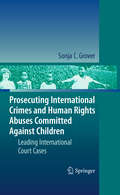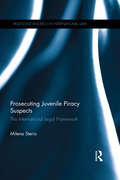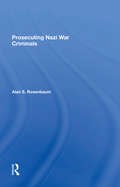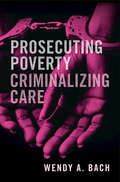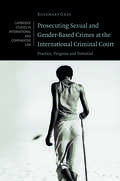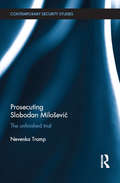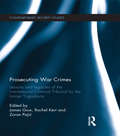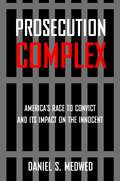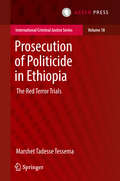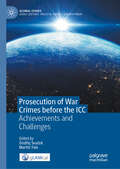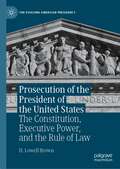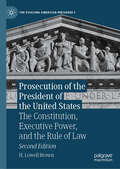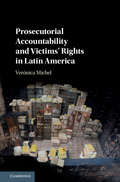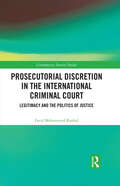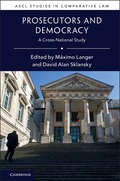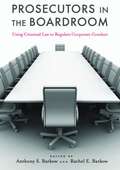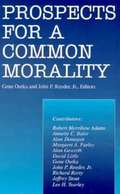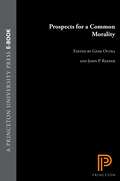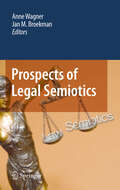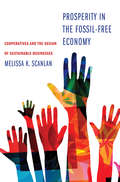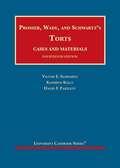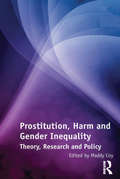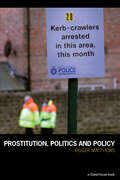- Table View
- List View
Prosecuting International Crimes and Human Rights Abuses Committed Against Children
by Sonja C. GroverThis casebook addresses selected precedent-setting rulings of various international human rights and international criminal courts with a focus on the child victims of international crimes and human rights abuses. The cases are analyzed from a children's human rights perspective and the question is examined as to what extent the international courts are according these children justice.
Prosecuting Juvenile Piracy Suspects: The International Legal Framework (Routledge Research in International Law)
by Milena SterioDuncan Gaswaga, a former judge of the Seychelles Supreme Court who has presided over numerous piracy trials, asked the following question: "What is a judge to do when a bearded piracy suspect facing justice asserts that he is fourteen?" This book addresses this important question by focusing on the treatment of juvenile piracy suspects under international law within national prosecutorial regimes. Beginning with the modern-day Somali piracy model, and exploring the reasons for piracy organizers and financiers to have employed Somali youth as pirates, author Milena Sterio analyzes the relevant international legal framework applicable to the treatment of juvenile criminal suspects, such as international human rights law, international criminal law, including the statutes of several international and ad hoc tribunals, as well as legal issues related to the use of child soldiers, as a parallel to the use of child pirates. This volume examines recent national piracy prosecutions involving juvenile suspects in Germany, Spain, India, Italy, Malaysia, the Seychelles, and the United States, developing a set of recommendations and best practices for all piracy prosecuting nations dealing with juvenile suspects to refer to in developing their national policy toward the treatment of juvenile piracy suspects.
Prosecuting Maritime Piracy
by Michael P. Scharf Scharf, Michael P. and Newton, Michael A. and Sterio, Milena Michael A. Newton Milena SterioThis book addresses maritime piracy by focusing on the unique and fascinating issues arising in the course of domestic piracy prosecutions, from the pursuit and apprehension of pirates to their trial and imprisonment. It examines novel matters not addressed in other published works, such as the challenges in preserving and presenting evidence in piracy trials, the rights of pirate defendants, and contending with alleged pirates who are juveniles. A more thorough understanding of modern piracy trials and the precedent they have established is critical to scholars, practitioners, and the broader community interested in counter-piracy efforts, as these prosecutions are likely to be the primary judicial mechanism to contend with pirate activity going forward.
Prosecuting Nazi War Criminals
by Alan S RosenbaumIt has been nearly fifty years since the collapse of the Nazi regime; is there any longer a point to presenting for the apprehension and prosecution of surviving Nazi war criminals? In this carefully argued book, Alan Rosenbaum makes it clear that there is. He contends that apart from concerns about obligations to the dead or vengeance against the
Prosecuting Poverty, Criminalizing Care
by Wendy A. BachAt the height of the opiate epidemic, Tennessee lawmakers made it a crime for a pregnant woman to transmit narcotics to a fetus. They promised that charging new mothers with this crime would help them receive the treatment and support they often desperately need. In Prosecuting Poverty, Criminalizing Care, Wendy Bach describes the law's actual effect through meticulous examination of the cases of 120 women who were prosecuted for this crime. Drawing on quantitative and qualitative data, Bach demonstrates that both prosecuting 'fetal assault', and institutionalizing the all-too-common idea that criminalization is a road to care, lead at best to clinically dangerous and corrupt treatment, and at worst, and far more often, to an insidious smokescreen obscuring harsh punishment. Urgent, instructive, and humane, this retelling demands we stop criminalizing care and instead move towards robust and respectful systems that meet the real needs of families in poor communities.
Prosecuting Sexual and Gender-Based Crimes at the International Criminal Court: Practice, Progress and Potential (Cambridge Studies in International and Comparative Law #143)
by Rosemary GreyThe 1998 Rome Statute, the treaty establishing the International Criminal Court (ICC), includes a longer list of gender-based crimes than any previous instrument of international criminal law. The Statute's twentieth anniversary provides an opportunity to examine how successful the ICC has been in prosecuting those crimes, what challenges it has faced, and how its caselaw on these crimes might develop in future. Taking up that opportunity, this book analyses the ICC's practice in prosecuting gender-based crimes across all cases for war crimes, crimes against humanity and genocide in the ICC up until mid-2018. This analysis is based on a detailed examination of court records and original interviews with prosecutors and gender experts at the Court. This book covers topics of emerging interest to practitioners in this field, including wartime sexual violence against men and boys, persecution on the grounds of gender and sexual orientation, and sexual violence against 'child soldiers'.
Prosecuting Slobodan Milošević: The Unfinished Trial (Contemporary Security Studies)
by Nevenka TrompThis book offers a comprehensive analysis of the trial of former Serbian leader Slobodan Milošević at the International Criminal Tribunal for the former Yugoslavia (ICTY). With the premature death of Milošević in March 2006 his trial was left unfinished. Although the traditional objectives of criminal law, such as retribution, justice for victims, and deterrence, were not achieved, the Milošević trial archive is a significant historical resource for researchers from various fields. This book extracts details from the collection of documentary and transcript evidence that makes up the trial record – sources which would be almost impossible to extricate without an insider’s guiding hand – to allow readers to trace the threads of several historical narratives. The value of this methodology is particularly evident in the Milošević case as, acting as his own defence counsel, he responded to, and interacted with, almost all witnesses and evidence presented against him. By providing snapshots of the behaviour displayed by Milošević in court while conducting his defence, in combination with passages of carefully selected evidence from an immense archive familiar to few scholars, this volume reveals how these trial records, and trail records in general, are a truly invaluable historical source. The book underlines the premise that any record of a mass atrocities trial, whether finished or unfinished, establishes a record of past events, contributes to interpretations of a historical period and influences the shaping of collective memory. This book will be of much interest to students of the Former Yugoslavia, war crimes, international law, human rights, international relations and European politics.
Prosecuting War Crimes: Lessons and legacies of the International Criminal Tribunal for the former Yugoslavia (Contemporary Security Studies)
by Rachel Kerr James Gow Zoran PajićThis volume examines the legacy of the International Criminal Tribunal for the former Yugoslavia (ICTY), which was created under Chapter VII of the UN Charter as a mechanism explicitly aimed at the restoration and maintenance of international peace and security. As the ICTY has now entered its twentieth year, this volume reflects on the record and practices of the Tribunal. Since it was established, it has had enormous impact on the procedural, jurisprudential and institutional development of international criminal law, as well as the international criminal justice project. This will be its international legacy, but its legacy in the region where the crimes under its jurisdiction took place is less clear; research has shown that reactions to the ICTY have been mixed among the communities most affected by its work. Bringing together a range of key thinkers in the field, Prosecuting War Crimes explores these findings and discusses why many feel that the ICTY has failed to fully engage with people’s experiences and meet their expectations. This book will be of much interest to students of war crimes, international criminal law, Central and East European politics, human rights, and peace and conflict studies.
Prosecution Complex: America's Race to Convict and Its Impact on the Innocent
by Daniel S. MedwedAmerican prosecutors are asked to play two roles within the criminal justice system: they are supposed to be ministers of justice whose only goals are to ensure fair trials—and they are also advocates of the government whose success rates are measured by how many convictions they get. Because of this second role, sometimes prosecutors suppress evidence in order to establish a defendant’s guilt and safeguard that conviction over time. In Prosecution Complex, Daniel S. Medwed shows how prosecutors are told to lock up criminals and protect the rights of defendants. This double role creates an institutional “prosecution complex” that animates how district attorneys’ offices treat potentially innocent defendants at all stages of the process—and that can cause prosecutors to aid in the conviction of the innocent. Ultimately, Prosecution Complex shows how, while most prosecutors aim to do justice, only some hit that target consistently.
Prosecution of Politicide in Ethiopia: The Red Terror Trials (International Criminal Justice Series #18)
by Marshet Tadesse TessemaThis book investigates the road map or the transitional justice mechanisms that theEthiopian government chose to confront the gross human rights violations perpetratedunder the 17 years’ rule of the Derg, the dictatorial regime that controlled state powerfrom 1974 to 1991. Furthermore, the author extensively examines the prosecution ofpoliticide or genocide against political groups in Ethiopia.Dealing with the violent conflict, massacres, repressions and other mass atrocities ofthe past is necessary, not for its own sake, but to clear the way for a new beginning.In other words, ignoring gross human rights violations and attempting to close thechapter on an oppressive dictatorial past by choosing to let bygones be bygones, is nolonger a viable option when starting on the road to a democratic future. For unaddressedatrocities and a sense of injustice would not only continue to haunt a nation butcould also ignite similar conflicts in the future.So the question is what choices are available to the newly installed government whenconfronting the evils of the past. There are a wide array of transitional mechanismsto choose from, but there is no “one size fits all” mechanism. Of all the transitionaljustice mechanisms, namely truth commissions, lustration, amnesty, prosecution,and reparation, the Ethiopian government chose prosecution as the main means fordealing with the horrendous crimes committed by the Derg regime.One of the formidable challenges for transitioning states in dealing with the crimes offormer regimes is an inadequate legal framework by which to criminalize and punishegregious human rights violations. With the aim of examining whether or not Ethiopiahas confronted this challenge, the book assesses Ethiopia’s legal framework regardingboth crimes under international law and individual criminal responsibility.This book will be of great relevance to academics and practitioners in the areas ofgenocide studies, international criminal law and transitional justice. Students in thefields of international criminal law, transitional justice and human rights will alsofind relevant information on the national prosecution of politicide in particular andthe question of confronting the past in general.Marshet Tadesse Tessema is Assistant Professor of the Law School, College of Law andGovernance at Jimma University in Ethiopia, and Postdoctoral Fellow of the SouthAfrican-German Centre, University of the Western Cape in South Africa.
Prosecution of War Crimes before the ICC: Achievements and Challenges (Global Issues)
by Martin Faix Ondřej SvačekThis book draws inspiration from existing practices of the ICC and analyzes some of these achievements and challenges concerning the prosecution of war crimes/enforcement of IHL before the ICC. The common denominator of all contributions is therefore twofold: (i) war crimes, and (ii) the ICC. All contributions identify and unfold issues that present obstacles on the way to the desired aforementioned goal of a successful prosecution of war crimes. Upon assessment of particular issues, the book reveals whether the stance adopted by the ICC either makes reaching this goal easier (achievement), more difficult (challenge), or potentially both.
Prosecution of the President of the United States: The Constitution, Executive Power, and the Rule of Law (The Evolving American Presidency)
by H. Lowell BrownThis book provides a detailed look at the constitutional, historical, and political arguments concerning presidential immunity from prosecution, as well as the opinions of the Office of Legal Counsel that provided the justification for the decision not to prosecute President Trump. Focusing on those opinions, the book examines the constitutional basis of presidential immunity, both textual and historical, as reflected in the deliberations of the 1787 Convention and the ratification debates. The opinions are viewed in the context of the criminal investigations of Presidents Nixon and Clinton that gave rise to those opinions, as well as the pronouncements of the Supreme Court concerning their claims, and those of President Trump to immunity from judicial inquiry. Lastly, the book analyzes presidential immunity in light of the separation of powers, the availability of impeachment, and the discordance between presidential immunity and the rule of law.
Prosecution of the President of the United States: The Constitution, Executive Power, and the Rule of Law (The Evolving American Presidency)
by H. Lowell BrownThis book provides a detailed look at the constitutional, historical, and political arguments concerning presidential immunity from prosecution, as well as the opinions of the Office of Legal Counsel that provided the justification for the decision not to prosecute President Trump. Focusing on those opinions, the book examines the constitutional basis of presidential immunity, both textual and historical, as reflected in the deliberations of the 1787 Convention and the ratification debates. The opinions are viewed in the context of the criminal investigations of Presidents Nixon and Clinton that gave rise to those opinions, as well as the pronouncements of the Supreme Court concerning their claims, and those of President Trump to immunity from judicial inquiry. Lastly, the book analyzes presidential immunity in light of the separation of powers, the availability of impeachment, and the discordance between presidential immunity and the rule of law. This new edition includes audiobook files at the chapter level.
Prosecutorial Accountability and Victims' Rights in Latin America
by Verónica MichelThe responsibility of any state is to protect its citizens. But if a state, either through omission or commission, fails to investigate and prosecute crime then what remedies do citizens have? Verónica Michel investigates procedural rights in Chile, Guatemala, and Mexico that allow citizens to call for the appointment of a private prosecutor to initiate criminal investigations. This right diminishes the monopoly of the state over criminal prosecutions and thus offers citizens a way of insisting on state accountability. This book provides the first full-length empirical study of how the victims' right to private prosecution can impact access to justice in Latin America, and shows how institutional and legal arrangements interact to shape the politics of criminal justice. By examining homicide cases in detail, Michel highlights how everyday legal struggles can help build the rule of law from below. Offers the first detailed evidence-based study of the right to private prosecution in Latin America, and its impact on access to justice; Focuses on violations to the right to a judicial remedy in homicide cases, comparing the experience of victims of crimes and victims of human rights abuses; Argues that procedural rights and the criminal justice system can work in favor of victims
Prosecutorial Discretion in the International Criminal Court: Legitimacy and the Politics of Justice (Contemporary Security Studies)
by Farid Mohammed RashidThis book provides the first scholarly investigation of prosecutorial discretion in the International Criminal Court (ICC) from an interdisciplinary perspective. This work analyses the discretionary power of the ICC prosecutor and its scope. It explains that there is a tendency to overlook the necessity of distinguishing between the various usages of discretion when exercised as a power authorised by the law and effect when applying indeterminate legal thresholds. The author argues that the latter indeterminacy may give decision makers an unwarranted opportunity to exercise a wide range of discretion, where extra-legal factors may be considered. In comparison, prosecutorial discretion allows decision makers to consider extra-legal considerations. This book also discusses the relevance of political considerations within the decision-making process in the context of the exercise of prosecutorial discretion. It suggests that there need not be a conflict between the broad sense of justice as outlined in the Statute and political factors in giving effect to decisions. This book will be of interest to students of international law, global governance and international relations.
Prosecutors and Democracy: A Cross-National Study (ASCL Studies in Comparative Law)
by Máximo Langer Sklansky David AlanFocusing squarely on the relationship between prosecutors and democracy, this volume throws light on key questions about prosecutors and what role they should play in a democracy. Internationally distinguished scholars discuss how prosecutors can strengthen democracy, how they can undermine it, and why it has proven so challenging to hold prosecutors accountable while insulating them from politics. Drawing on experiences from the United States, the UK and continental Europe, the contributors show how different legal systems have addressed that challenge in very different ways. Comparing and contrasting those strategies allows us to assess their relative strengths - and to gain a richer understanding of the contested connections between law and democratic politics. Chapters are in explicit conversation with each other, showing how each author's perspective informs, or differs from, that of the others. This is an ideal resource for legal scholars and reformers, political philosophers, and social scientists.
Prosecutors in the Boardroom: Using Criminal Law to Regulate Corporate Conduct
by Rachel E. Barkow Anthony S. BarkowWho should police corporate misconduct and how should it be policed? In recent years, the Department of Justice has resolved investigations of dozens of Fortune 500 companies via deferred prosecution agreements and non-prosecution agreements, where, instead of facing criminal charges, these companies become regulated by outside agencies. Increasingly, the threat of prosecution and such prosecution agreements is being used to regulate corporate behavior. This practice has been sharply criticized on numerous fronts: agreements are too lenient, there is too little oversight of these agreements, and, perhaps most important, the criminal prosecutors doing the regulating aren’t subject to the same checks and balances that civil regulatory agencies are. Prosecutors in the Boardroom explores the questions raised by this practice by compiling the insights of the leading lights in the field, including criminal law professors who specialize in the field of corporate criminal liability and criminal law, a top economist at the SEC who studies corporate wrongdoing, and a leading expert on the use of monitors in criminal law. The essays in this volume move beyond criticisms of the practice to closely examine exactly how regulation by prosecutors works. Broadly, the contributors consider who should police corporate misconduct and how it should be policed, and in conclusion offer a policy blueprint of best practices for federal and state prosecution.Contributors: Cindy R. Alexander, Jennifer Arlen, Anthony S. Barkow, Rachel E. Barkow, Sara Sun Beale, Samuel W. Buell, Mark A. Cohen, Mariano-Florentino Cuellar, Richard A. Epstein, Brandon L. Garrett, Lisa Kern Griffin, and Vikramaditya Khanna
Prospects for a Common Morality
by Gene Outka John P. Reeder<p>This volume centers on debates about how far moral judgments bind across traditions and epochs. Nowadays such debates appear especially volatile, both in popular culture and intellectual discourse: although there is increasing agreement that the moral and political criteria invoked in human rights documents possess cross-cultural force, many modern and postmodern developments erode confidence in moral appeals that go beyond a local consensus or apply outside a particular community. Often the point of departure for discussion is the Enlightenment paradigm of a common morality, in which it is assumed that certain unchanging beliefs inhere in the structure of human reason. Whereas some thinkers continue to defend this paradigm, others modify it in diverse ways without abandoning entirely the attempt to address a universal audience, and still others jettison virtually all of its distinguishing features. <p>Exhibiting a range of positions Western participants take in these debates, this volume seeks to advance the substance of the debates themselves without prejudging the outcome. Rival assessments of the Enlightenment paradigm are offered from various philosophical and theological points of view. In addition to the editors, the contributors include Robert Merrihew Adams, Annette C. Baier, Alan Donagan, Margaret A. Farley, Alan Gewirth, David Little, Richard Rorty, Jeffrey Stout, and Lee H. Yearley.</p>
Prospects for a Common Morality
by Gene Outka and John P. ReederThis volume centers on debates about how far moral judgments bind across traditions and epochs. Nowadays such debates appear especially volatile, both in popular culture and intellectual discourse: although there is increasing agreement that the moral and political criteria invoked in human rights documents possess cross-cultural force, many modern and postmodern developments erode confidence in moral appeals that go beyond a local consensus or apply outside a particular community. Often the point of departure for discussion is the Enlightenment paradigm of a common morality, in which it is assumed that certain unchanging beliefs inhere in the structure of human reason. Whereas some thinkers continue to defend this paradigm, others modify it in diverse ways without abandoning entirely the attempt to address a universal audience, and still others jettison virtually all of its distinguishing features. Exhibiting a range of positions Western participants take in these debates, this volume seeks to advance the substance of the debates themselves without prejudging the outcome. Rival assessments of the Enlightenment paradigm are offered from various philosophical and theological points of view. In addition to the editors, the contributors include Robert Merrihew Adams, Annette C. Baier, Alan Donagan, Margaret A. Farley, Alan Gewirth, David Little, Richard Rorty, Jeffrey Stout, and Lee H. Yearley.
Prospects in International Investment Law and Policy
by Roberto Echandi Pierre SauvéThe negotiation of a patchy but burgeoning network of international investment agreements and the increasing use to which they are put is generating a growing body of jurisprudence which, while still evolving, requires closer analytical scrutiny. Drawing on many of the most distinguished voices in investment law and policy, and offering novel, multidisciplinary perspectives on the rapidly evolving landscape shaping international investment activity and treaty-making, this book explores the most important economic, legal and policy challenges in contemporary international investment law and policy. It also examines the systemic implications flowing from frenetic recent judicial activism in investment matters and advances several innovative propositions for how best to promote greater overall coherence in rule-design, treaty use and policy making and thus offer a better balance between the rights and obligations of international investors and host states.
Prospects of Legal Semiotics
by Jan M. Broekman Anne WagnerThis book examines the progress to date in the many facets - conceptual, epistemological and methodological - of the field of legal semiotics. It reflects the fulfilment of the promise of legal semiotics when used to explore the law, its processes and interpretation. This study in Legal Semiotics brings together the theory, structure and practise of legal semiotics in an accessible style. The book introduces the concepts of legal semiotics and offers an insight in contemporary and future directions which the semiotics of law is going to take. A theoretical and practical oriented synthesis of the historical, contemporary and most recent ideas pertaining to legal semiotics, the book will be of interest to scholars and researchers in law and social sciences , as well as those who are interested in the interdisciplinary dynamics of law and semiotics.
Prosperity in the Fossil-Free Economy: Cooperatives and the Design of Sustainable Businesses
by Melissa K ScanlanA blueprint for creating sustainable businesses, emphasizing the power and potential of cooperative models Drawing on both her extensive experience founding and directing social enterprises and her interviews with sustainability leaders, Melissa Scanlan provides a legal blueprint for creating alternate corporate business models that mitigate climate change, pay living wages, and act as responsible community members, including Certified B Corps and benefit corporations. With an emphasis on cooperatives, this book reveals the power and potential of cooperating as a unifying concept around which to design social enterprise achieving triple bottom-line results: for society, the environment, and finance.
Prosser, Wade And Schwartz's Torts, Cases And Materials (University Casebook Ser.)
by Victor Schwartz Kathryn Kelly David PartlettThrough its excellence in scholarship, clarity, and ease of use, this casebook engages readers in critical thinking about tort law and its operation in modern social settings. It sets forth crisply-edited classic tort cases, new tort law trends, and nuances in developing case law that impact the law and its application in the real world. Principal cases are not discarded just for the sake of change but because new cases reflect important changes in the law and present current doctrine in insightful and highly effective ways. The casebook goes beyond judicial decisions and includes key tort centered legislation and comparative perspectives where relevant. The casebook encourages the student to understand the English and American common law foundations of Tort law and to debate modern trends within various policy prescriptions. Unbiased in its approach and organized in manageable sections of information, the casebook is a superb tool for productive and stimulating classroom debate. The authors are an outstanding combination of respected scholars and practitioners. They have worked as a team since the 9th edition, published in 1994. Victor Schwartz was an Advisor on the first three sections of the Restatement (Third): Products Liability, Apportionment of Liability, and Physical and Emotional Harm. David Partlett is presently an Advisor on two new Restatements relating to liability for intentional torts and for defamation and privacy just established.
Prostitution, Harm and Gender Inequality: Theory, Research and Policy
by Maddy CoyProstitution, Harm and Gender Inequality brings together international research exploring the range of gendered harms to women involved in prostitution and the consequences of growth of the sex industry for global gender relations. While there is an increasing amount of research and academic output on prostitution, the current focus is often on discussion and critique of policy frameworks, and contemporary debates over harm are largely limited to sex trafficking and sexual exploitation of children. Less attention is paid to questions of how the sex industry perpetuates notions of objectification and male entitlement with respect to sexual access to women's bodies, despite being key feminist concerns for several decades. This position has become effectively marginalized, but the global growth and industrialization of the sex industry requires a return to these questions. Through exploring gendered inequality and re-engaging with an understanding of prostitution as harmful with impacts on the self and body that are experienced as abusive but do not always constitute violence, this book introduces a range of research and thinking, while also drawing on existing literature to explore the consequences of prostitution for women in the sex industry and wider gender relations. These issues are discussed with regard to: coercion and recruitment, including trafficking; notions of male entitlement in accounts of men who buy sex; critical interrogations of agency and choice; legal and policy frameworks; and representations of prostitution in popular culture.
Prostitution, Politics & Policy
by Roger MatthewsProstitution has become an extremely topical issue in recent years and attention has focused both on the situation of female prostitutes and the adequacy of existing forms of regulation. Prostitution, Politics & Policy brings together the main debates and issues associated with prostitution in order to examine the range of policy options that are available. Governments in different parts of the world have been struggling to develop constructive policies to deal with prostitution – as, for example, the British Home Office recently instigated a £1.5 million programme to help address the perceived problems of prostitution. In the context of this struggle, and amidst the publication of various policy documents, Prostitution, Politics & Policy develops a fresh approach to understanding this issue, while presenting a range of what are seen as progressive and radical policy proposals. Much of the debate around prostitution has been polarized between liberals – who want prostitution decriminalized, normalized and humanized – and conservatives – who have argued that prostitution should be abolished. But, drawing on a wide range of international literature, and providing an overview that is both accessible to students and relevant to policy makers and practitioners, Roger Matthews proposes a form of radical realism that is irreducible to either of these two positions.
